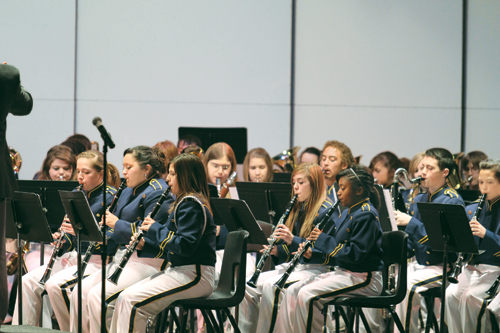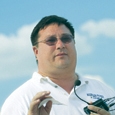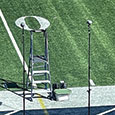Duane Chun, band director at Buena High School in Sierra Vista, Arizona has developed effective techniques for fast-paced rehearsals that keep students focused, even when band meets at 6:30 in the morning. He shares a few of these principles that will help both new and experienced directors.
.jpg) What led you to teaching band?
What led you to teaching band?
My father was career army, 33 years, and I went to five different high schools. With every move and transfer, band allowed me to fit in instantly. Everywhere I went band directors made me feel welcome. Music is the same in Mississippi and Arizona. We were even in Iran in 1978-79 where I went to the Tehran American High School, a private school with 3,000 students, many of whom were children of defense contractor employees. We had two or three football teams that played each other because there were no other schools to play. The band played the school fight song for every touchdown. It was an interesting time in the world and made you appreciate the United States. We came home when President Carter sent C-130 planes that took us off to Germany.
At first I thought I was going to follow a military career and go into the army band, but that didn’t work out. I went to Arizona State, and band was my thing. It was a natural progression after college to teach high school band.
What is your approach to warm-ups?
I really emphasize tuning. At the start of the year I spend quite a bit of time on how to tune because students often do not know what to do. I focus on the difference between being in tune and out of balance. Especially in marching season students have a tendency to overblow and end up very sharp or flat. At Arizona State, Richard Strange once gave us (wind ensemble) a 50-minute lecture on the importance of intonation (the result of a complaining trumpet player). Of course his reasoning and justification were inarguable, and from then on I knew I would never tune an ensemble to just concert Bb; I also tune F, G, and A. That way we address the tuning tendencies of all the instruments and have a better chance to find a good tonal center.
We also look at what it means to play in tune at the loudest part, and how loud they can play before it crosses the line and becomes out of balance. Sometimes when we start working on a piece after the initial warm-up, they overblow and do not play the same way they did while tuning. I usually spend 15 or 20 minutes on tuning at each rehearsal for the first couple of weeks of the school year.
Students should learn what to do when they are not in tune and not just rely on the director. I always ask, “if you don’t know, what are you going to do if I am not there?” When I first started teaching I relied too much on the tuner, and students ended up tuning more by what they saw on the tuner than by what they were hearing with their ears. Now, I emphasize having the band in tune with itself by focusing on understanding what is happening harmonically versus finding an absolute 440. By the end of the year I will ask a student who has an advanced tone to provide a reference pitch, but initially we use a mechanical pitch to practice listening instead of lining up the tuner’s needle or stopping the strobe from spinning.
What books do you use for warm-ups?
I particularly like the Leonard B. Smith Treasury of Scales and Bach chorales. Our AP theory class arranges one of the chorales into a band key. Sometimes I will use the student arrangements in band rehearsals. Bill Humbert has also written eight warm-up chorales that I have adapted.
.jpg) What techniques lead to effective rehearsals?
What techniques lead to effective rehearsals?
Students know that I am predictable. If someone is caught chewing gum, I have a standard lecture that that no one wants to hear again. Students soon start disciplining themselves to avoid the inevitable consequences. It is the same with warm-up exercises. Students know we will do some type of tuning at the beginning of the period every day. When they walk through the door, there is no time to talk about Saturday night. They get the instruments out and are ready for the pitch after morning announcements. Establishing routines and procedures at the start gets rehearsals moving quickly and puts to bed some of the silliness and wasted time that sometimes creep in as a bad habit.
I try to be an open book and tell students what I am doing in class and why. Because we do not have a long rehearsal period, only 55 minutes, and spend a lot of time on tuning, I stay on problems until they are fixed. As a young director, I would write a lesson plan, and my goal was to address each bullet point no matter what. I focused on starting at the top of the page and going all the way to the end, or I would start at the beginning when I knew I really should work on letter B. Now, I start where the problems are. I wasted a lot of time running straight through pieces, and it promotes bad habits.
My lessons plans today are more about good score preparation so that I can recognize when I should stop and fix something. That was a hard thing to learn. I am a good judge of the attitude of the room and know when I should stop and when to keep plowing through. I like a fast-paced rehearsal and will always have questions in my mind and know what sections I want to work on.
How do you know when to stop the band?
That is tough because you have to decide whether the problem is something that can be fixed now, or whether students should mark that spot for personal practice to be checked the next day. I always stop for blatant rhythmic or pitch problems, but I might not if it is a question of nuance or style. Last year we played a Scott Joplin transcription for band. During rehearsals it was either too rhythmic and straight or too honky-tonk and did not convey a true ragtime piano style. I challenged the band to find recordings that demonstrated the correct style. They found three or four good videos, and we listened to one during rehearsal. That cleaned up the style problem right away.

What other techniques do you use?
I do not stay fixed at the podium. Many young directors seem glued in place. It is not unusual for me to walk to the back of the room to hear how it sounds. When I run a rehearsal, students know that I am listening to everybody. Anyone is liable to get asked a question. I usually ask a question of the whole group only when I am confident about the answer I will get and can use it to move the rehearsal forward. I try not to humiliate or embarrass students but instead want to set them up for success. I also always praise in public and discipline in private.
I make sure that I know students’ names. In marching band there are 156 students, and it is easy for some to sit in the back of the room and hide. If a director knows student names, there is a one-on-one connection. Because I take the time to get to know them, we can have a conversation outside of school at the mall or grocery store. They are comfortable with me and willing to share what is important to them or invite me to a Boy Scout award dinner.
Early in my career, I was a bit scared of my students. I had a barrier and did not want them to know me or my personal life. Now that I have taught for a while, I am more confident. This is experience that perhaps just has to come with age. There is often only a four-year age difference between players and beginning directors, and they have to know where the line is. One thing that helps is good communication with parents.
I tell students that I will not be their friend on Facebook, but they have my cell phone number and can text me if they need help. A text I can ignore, if necessary. I tell students that on Star Trek, the crew could always get in touch with the captain by tapping on a communicator. I ask them whether they think the crew did that all the time or only when necessary. The message is that I am available if they need me, but don’t waste my time.
What is your approach to programming?
I used to have a core repertoire that I repeated, but there are so many good band composers that I frequently listen to CDs of new music and ask other directors what they are playing. I like the music of Richard Saucedo, David Holsinger, and Samuel Hazo, and if Robert Smith’s name is on a work, I will do it. I don’t play the same things every year, other than Sousa. I love marches and always put two marches and one patriotic piece on a program. We are a military town after all.
When the new CDs come out, I let students listen and pick one song they want to play. Invariably, they will choose a pop piece from a Broadway show like Wicked or a medley from the current trending teen idol. It does not mean that I will program it on a concert, but we can have some fun working through them, and sometimes I am surprised. For the other works, I pick grade 3 or 4 music that I know they can handle and two pieces that will stretch them like Robert Smith’s Inchon.
Do you ever have to overcome initial reluctance from students about a piece?
Sometimes they do not understand how the work will come together at the performance. I remember working on Eric Whitacre’s Sleep, which is based on a beautiful poem. It is supposed to be a lullaby, but the band was playing it more like a funeral dirge. The band supports the vocal part, and at times, it was like pulling teeth to get them to work on it. They hated that piece initially. A community choir was to sing it on a program, and I frequently reminded them that their relatives were in that choir and they wanted to do well for them. In the end they loved the piece when it was put together with the choir.
Another time Betsy Bright Morgan, trumpet in the Tucson Symphony, played Carnival of Venice with us. Upon first read through with no soloist, the students felt the band parts were unexciting, and they did not understand what they would be supporting. However, after Betsy came to a rehearsal, they quickly rose to the occasion. Their interest and intensity increased dramatically.
When students understand and believe in the goals of the program, they become enthusiastic and work towards making it a success. For the last 10 or 12 years I have sent the student officers and section leaders to a leadership camp held by Bill Humbert. He is a great motivational speaker and teaches students how to support the director. They come back from camp with great ideas. Once they invest in the program, you have them.
How do you avoid discipline problems?
Discipline problems go away when students have goals to work towards. One year we made a goal for making the local newspaper at least every two weeks, and they did. It was anything from advertising a fundraiser to highlighting an alum who had done something impressive or announcing students who were selected for honor bands. It not only inspired the students but was a good way to promote a positive image for the Buena bands. We have a good relationship with our community which is essential when we have to ask for money during fundraising efforts.
Students also help determine what the band room looks like. Classroom management books say that students work best in a welcome and receptive environment. I let students take charge of the calendar and the bulletin board. We have posters and sayings on the wall. One says, “If everybody in the band was like me, how good would the band be?” They have taken it upon themselves to promote the image of the band. That goes back to maintaining a legacy for the band. Since I played in this program when I was in high school, it is very important to me that we maintain the standards over time. I marched the same field that they do.
I have also found that peer pressure can be positive and negative, and encourage the older students to serve as good role models. A senior might see a younger student about to leave something valuable unattended, like a box of fundraising candy or an instrument. He will say, “I don’t want to sit through the fifty dollar bill lecture again.” (The lecture is about if you leave a $50 bill on a chair and walked away from it, would you expect it to still be there at the end of the day – even if your name was on it?) The first day of marching season is for new members only. It is an orientation session to go over rules and policies for the younger students. This year we are incorporating a year-long mentoring program called Bigs and Littles.
For sectional rehearsals students bring me a lesson plan on what measures they think we should work on. I may tweak their ideas because often they try to bite off too much and want to work on an entire song. Sometimes I have to help with particular rhythms and fingerings but largely they have taken that upon themselves. I tell them that they are a reflection of me, and I of them. If they make me look good, we all look good.
How are your students graded for band?
Currently band grades are calculated on a total point system based on attendance, preparation, performance, and participation. The two-hour marching band receives a full credit in the fall semester. I am working on a proposal to include an honors component because I have students who want to be in band but even an A will lower their GPA because they take many AP classes. I have some parents who want to have their children audit band. Philosophically, I would not mind, but unless I have a grade to hold over them, it hurts accountability. There might be a few who would benefit from this, but the district is not willing to do it. I have sufficient enrollment numbers that I do not need students to audit.
How do you make students practice?
I try to identify measures to practice without putting an amount of time on it. To check their work, I might call on students to play measures in the middle of class. My best students in wind ensemble practice, or we would not be able to play the music. I tell students that if you want to play “Twinkle Twinkle, Little Star” don’t practice. The advanced group knows that if they want to make all-state or play challenging music, they have to work at it.
What common problems do you observe in younger directors?
They often overprogram and try to play the 1812 Overture with a ten-piece band. Young directors should become familiar with the repertoire and pick music appropriate for their groups. The pieces they played in college will not help with this task. When I was in college we had to listen to recordings and put together sample programs that were realistic for school ensembles. They also should learn what sound they should aim for on instruments other than their own. Know the major performers on those instruments and listen to them to understand what they should sound like.
In addition to the musical side, they will have to learn to prepare a budget and deal with parents. When I first started teaching, we had a strong parent association for the music department, and I was too young to tell them when they went off topic. The solution was for the vice principal to come to all of the meetings to keep them focused on music concerns. I feel fortunate that I had some very good mentors along the way who gave me sound advice that I was smart enough to follow.
How has the role of the parents’ association changed over the course of your career?
It is a business these days. Our parents’ association is a 501c3, and I never thought I would know so much about tax law. There could be a whole class on this for future directors. When I first started teaching, the organization was just a nice group of parents who were there to help. Later, I learned that there are really two parents groups – the formal group with a president and a vice president and the group that meets in the parking lot after football games. It is sometimes difficult to find consensus between the two groups, but with experience I have learned which parents will be there in a heartbeat if I need help. The formal organization is sometimes the only way to get grants because schools are not considered non-profits in some cases. We sometimes send parents to a grant writing class at a community college. Many civic groups, like the Kiwanis, require elaborate budget and tax information. In the end you need both – a formal organization that provides structure, stability, and support for the vital short and long term goals of the band; and the informal help of people who may not be able to make every meeting but will be there when the call is put out.
What is the best experience you have had with your band?
Many young directors are afraid to take groups on trips, but it can be so rewarding. I have had many memorable moments with my bands, including when my drum majors along with an active duty band dad had the honor of laying wreaths at Arlington Cemetery and Pearl Harbor and a band performance on the Great Wall of China. I taught English in China for the five summers before the 2008 Olympics. At the time China was providing incentives for Westerners to come and teach hotel and entertainment workers the idioms and practices of the West.
I brought a jazz band to China with a total group of 40 people. With sponsorship the cost per person was just $1,600. We played concerts at several schools in China, but the highlight of the trip was performing on the Great Wall. There were thousands of people from all over the world standing around, and when we started playing “What a Wonderful World,” everybody just stopped and started swaying. I will never forget it. The students knew that they were ambassadors not only for the school but for our country.

* * *
Buena High School is located in Sierra Vista, Arizona, about 90 miles southeast of Tucson. The town includes Fort Huachuca military base. Buena is the only high school in the city with an enrollment of 2,200 and 200 students in the band program. In the fall marching band meets for a two-hour block in the morning from 6:35 to 8:30. There is also a freshman pep band although advanced freshmen may play in the varsity band. This year they will have an AP music theory class and a stage band. An assistant director teaches two hours a day in the elementary schools.
There are six elementary schools and one middle school that feed into the high school. Because Arizona has open enrollment, students from the surrounding communities can choose to attend Buena H.S. Those that do are usually interested in the fine arts, choir, band, or drama. because other area high schools have much smaller music programs.
Duane Chun has taught at Buena High School for 20 years. He had previously taught in Montville Township, New Jersey for seven years. Chun was a graduate of Buena in 1981 and took over the program from his own high school director. He comments, “We are still colleagues. He is the community schools manager and I am his assistant. We serve as liaisons for our community’s after hours use of district school facilities. After 40 years he is still integral to our fine arts program and continues to run our top jazz band.”





